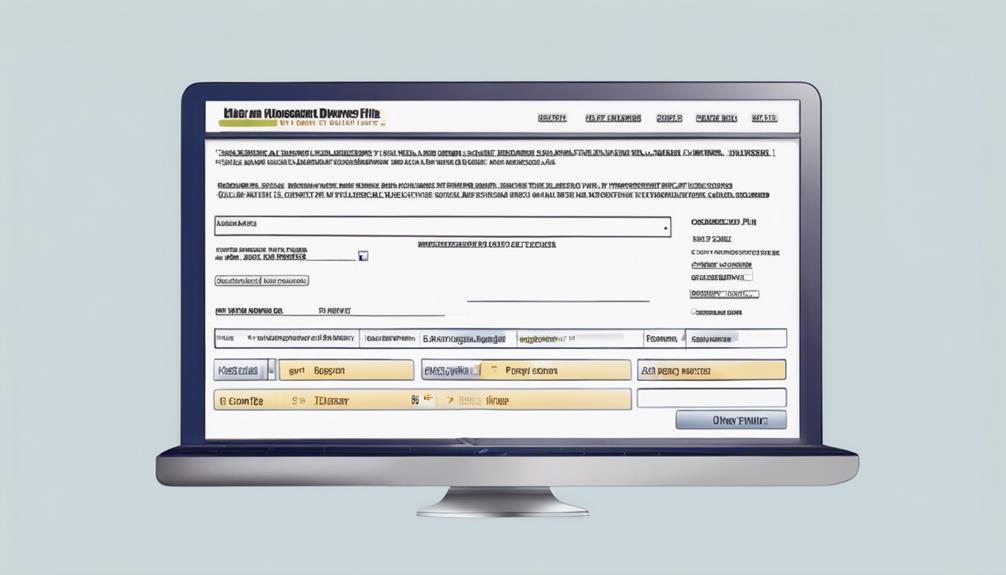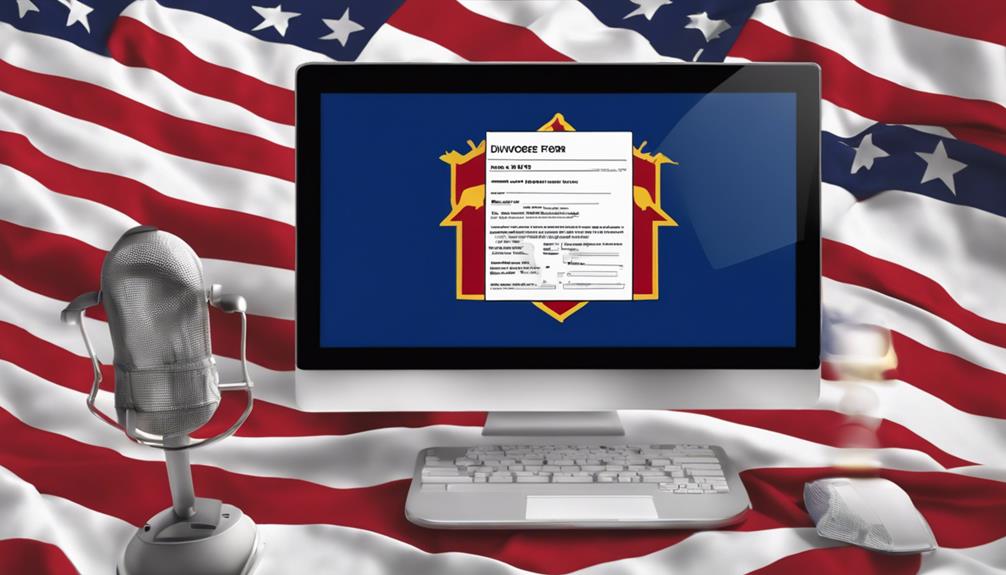In order to start an online divorce in Wisconsin, it is important to understand key factors. Residency requirements dictate that one must have lived in Wisconsin for at least six months and in the filing county for 30 days. The grounds for divorce are based on the marriage being irretrievably broken, with an emphasis on no-fault divorces. Providing detailed financial disclosures within 90 days of filing is crucial. Mediation can help with resolving disputes and distributing assets. Child custody arrangements prioritize the best interests of the child, taking into account legal and physical custody options. Temporary orders can offer immediate relief. The entire dissolution process typically takes around 120 days. Having a clear understanding of these elements is essential for a successful divorce process.
Key Takeaways
- Online divorce in Wisconsin requires meeting residency requirements.
- Complete and file necessary divorce forms accurately online.
- Consider property division, child custody, and support agreements online.
- Financial disclosures for asset division can be submitted online.
- Expedited services and efficient court filing streamline the online divorce process.
Residency Requirements in Wisconsin
To file for divorce in Wisconsin, a person must have been a resident of the state for at least six months. This residency requirement is crucial for establishing jurisdiction over the divorce proceedings.
Additionally, individuals seeking divorce must have resided in the specific county where they're filing for divorce for a minimum of 30 days. Both spouses are obligated to meet these residency conditions before initiating the divorce process in Wisconsin.
When it comes to child custody orders, the child in question must have lived in the state for a minimum of six months to meet the residency requirements. Meeting these criteria guarantees that the court has the authority to make decisions regarding custody arrangements.
Understanding and adhering to Wisconsin's residency requirements are fundamental steps in the divorce process, providing a legal foundation for the proceedings and custody determinations.
Grounds for Divorce in Wisconsin

In Wisconsin, the grounds for divorce are centered on the marriage being irretrievably broken. Specific reasons for divorce in Wisconsin include adultery, abandonment, cruelty, mental illness, and drunkenness.
Unlike fault-based grounds, a no-fault divorce in Wisconsin doesn't necessitate proof of wrongdoing.
Legal Grounds Overview
The legal grounds for divorce in Wisconsin center around the determination that the marriage is irretrievably broken. In Wisconsin, a no-fault divorce doesn't require proving fault, such as adultery or cruelty. This no-fault approach allows couples to end their marriage without blame.
The main focus in Wisconsin divorce cases is on whether the marriage is irretrievably broken, leading to its dissolution. Specific reasons like adultery or abandonment don't need to be proven for a divorce to be granted in Wisconsin. This approach simplifies the process and allows couples to move forward without getting caught up in assigning fault.
In a divorce case, the court will consider factors like marital property, financial disclosure statements, and the well-being of any children involved under Family Law during the proceedings.
Common Grounds Explained
Understanding the common grounds for divorce in Wisconsin is essential for maneuvering the legal process effectively. Wisconsin allows for both fault-based grounds like adultery, abandonment, cruelty, mental illness, and drunkenness, as well as a no-fault option based on the marriage being irretrievably broken.
In a no-fault divorce, individuals can seek to end their marriage without proving wrongdoing by either party. However, if desired, fault-based grounds such as adultery, abandonment, cruelty, mental illness, or drunkenness can also be cited.
Knowing these common grounds for divorce in Wisconsin empowers individuals to make informed decisions about their legal options and navigate the process with confidence.
Filing for Divorce in Wisconsin
When starting the divorce process in Wisconsin, it's essential to meet the residency requirements of living in the state for at least 6 months and in the county where you're filing for a minimum of 30 days. Filing for divorce in Wisconsin involves several key steps:
- Correctly completing and filing the necessary forms is vital to guarantee a smooth divorce process.
- Wisconsin is a no-fault divorce state, meaning the marriage only needs to be irretrievably broken for a divorce to be granted.
- Divorce can be filed jointly or individually, with a mandatory 120-day waiting period after filing before a final hearing.
- Filing for divorce first in Wisconsin doesn't provide any advantage, as the court will grant a divorce if the marriage is irretrievably broken, regardless of who filed.
- Important aspects to keep in mind during the divorce process include property division, child custody, support, and reaching a settlement agreement.
Financial Disclosures and Asset Division

Financial disclosures in Wisconsin divorces mandate detailed financial information within 90 days of filing, with updates required before the final court hearing.
Asset division in Wisconsin follows community property laws, typically resulting in equal splits, except for separate property like pre-marital assets or inheritance.
Mediation is available for asset distribution disputes, ensuring a fair resolution for both parties involved.
Required Financial Documents
Detailed financial disclosures are crucial in Wisconsin divorce proceedings, encompassing assets, debts, income, expenses, and financial accounts. These disclosures must be provided within 90 days of filing for divorce and updated before the final hearing. In Wisconsin, asset division adheres to equitable distribution laws, aiming for fairness rather than strict equality. Marital property is divided fairly, while separate property, obtained before marriage or through inheritance, is typically exempt from division. Ensuring accurate disclosure of financial details is paramount to achieving a just and equitable asset division in a Wisconsin divorce.
Parties are required to submit financial disclosures within 90 days of filing for divorce. The asset division process in Wisconsin is governed by equitable distribution laws. Separate property, such as assets acquired before marriage or through inheritance, is usually not subject to division. Accurate disclosure of financial information is essential for a fair outcome in asset division. Understanding the intricacies of financial details is vital for a successful divorce process in Wisconsin.
Fair Asset Distribution
Asset division in Wisconsin divorce proceedings involves a thorough examination of financial disclosures and the equitable distribution of marital property. Following Wisconsin's community property laws, assets are typically divided equally between spouses, taking into account separate property exemptions. Child support responsibilities are shared, with payments calculated based on income and other factors. Financial aspects play a pivotal role in the Wisconsin divorce process, having a substantial impact on the final settlement. Ensuring accurate financial disclosures and understanding asset division are key steps in managing a Wisconsin divorce efficiently. Below is a visual representation of the key components related to fair asset distribution:
| Financial Disclosures | Asset Division |
|---|---|
| Detailed information on finances required | Equitable distribution of assets |
| Submitted within 90 days of filing | Follows community property laws |
| Impact final settlement | Consider separate property exemptions |
Mediation for Disagreements
Mediation offers a collaborative approach for couples to resolve disputes regarding their financial situations and property division during divorce proceedings.
- An impartial third party assists in reaching voluntary agreements on financial disclosures and asset division.
- Financial disclosures entail detailed information about each party's financial situation, including assets, debts, income, and expenses.
- Asset division in mediation focuses on fairly dividing marital property, considering contributions to the marriage and future financial needs.
- Mediation helps couples find mutually acceptable solutions for asset division, fostering a more amicable and cost-effective divorce process.
Mediation and Dispute Resolution Methods

When managing divorce proceedings in Wisconsin, couples can enlist a neutral third party to help in reaching agreements on important matters such as child custody and property division through a process aimed at promoting communication and cooperation.
Mediation in Wisconsin offers a cost-effective and efficient way to resolve disputes, steering clear of lengthy court battles. This method encourages compromise, communication, and cooperation between spouses, leading to more satisfying and customized outcomes for both parties.
In the state of Wisconsin, mediation is often mandatory before proceeding to trial in contested divorce cases to foster settlements outside of court. By opting for mediation, couples retain more control over the divorce's outcome and can preserve relationships, which is especially essential when children are involved.
Embracing mediation not only streamlines the divorce process but also empowers individuals to make decisions that resonate with their unique circumstances and priorities.
Child Custody Arrangements in Wisconsin

In determining child custody arrangements in Wisconsin, the courts prioritize the best interests of the child. Types of custody include legal custody, which involves decision-making authority, and physical custody, determining where the child resides. Factors such as the child's relationship with each parent, their specific needs, and any history of abuse are considered in custody decisions by Wisconsin courts. Shared custody arrangements are common in the state to guarantee that both parents maintain a relationship with the child.
Child support calculations in Wisconsin are based on the income of both parents and the physical placement schedule. Wisconsin courts carefully evaluate various factors to make custody decisions, aiming to create arrangements that benefit the child's well-being. By prioritizing the child's best interests, the legal system in Wisconsin aims to make sure that custody arrangements are fair and conducive to the child's overall development and happiness.
Temporary Orders and Online Filing Options

Temporary orders in Wisconsin provide essential relief for individuals maneuvering divorce proceedings by addressing immediate concerns related to child custody, spousal support, and property division. These orders, typically decided by a commissioner, offer temporary solutions until a final resolution is reached. They help maintain stability during the divorce process, ensuring pressing issues are handled promptly.
Temporary orders can be modified or extended as necessary to adapt to changing circumstances. For those seeking convenience and efficiency, online filing options for temporary orders may be available in Wisconsin. This online option streamlines the process, making it easier for individuals to address their immediate concerns without the need for extensive paperwork or in-person visits.
Duration of Divorce Proceedings in Wisconsin

Typically, no-fault divorces in Wisconsin take approximately 120 days to finalize after filing. The duration of divorce proceedings can vary based on several factors within the divorce process:
- Contested divorces may take longer due to court hearings and unresolved issues.
- Factors like negotiation time and court schedules can impact the duration of divorce proceedings.
- Fault-based divorces, which require proof of wrongdoing, generally take longer to resolve.
- Expedited services and efficient court filing can help streamline the divorce process in Wisconsin.
Understanding the different types of divorces, such as uncontested and contested, can provide clarity on the potential timelines involved. While no-fault divorces offer a more straightforward path, contested cases might prolong the process due to the need for court intervention and resolution of disputes. By considering these factors and utilizing expedited services, individuals can navigate the divorce process more efficiently.
Frequently Asked Questions
Can You Get a Divorce Online in Wisconsin?
Yes, you can get a divorce online in Wisconsin. Online divorce services offer a convenient and cost-effective option for uncontested divorces. They provide access to editable Wisconsin divorce forms and allow for preparation and completion of papers from anywhere.
Can You Get a Divorce Without the Other Person Signing in Wisconsin?
In Wisconsin, a divorce can be granted without the other person signing if proper service is completed. The court can proceed based on proof of service, even if the spouse refuses to acknowledge the papers.
How Long Does an Uncontested Divorce Take in Wisconsin?
An uncontested divorce in Wisconsin typically takes about 120 days to finalize. The process begins upon filing the divorce petition. Factors like agreement on all issues and timely document submission can expedite proceedings, which vary based on court schedules and case complexity.
Do Divorce Papers Need to Be Notarized in Wisconsin?
In Wisconsin, divorce papers do not need notarization. This streamlined process offers convenience and flexibility for couples seeking divorce. Notarization is not a barrier in Wisconsin, allowing for a smoother and quicker divorce process.
Conclusion
To sum up, maneuvering through the online divorce process in Wisconsin can be like unraveling a intricate network of legal procedures. By grasping the residency requirements, reasons for divorce, filing procedures, and custody arrangements, couples can progress through the process with clarity and efficiency.
Keep in mind, seeking legal advice and utilizing online resources can help streamline the divorce proceedings, ensuring a smoother shift to the next chapter of life.










